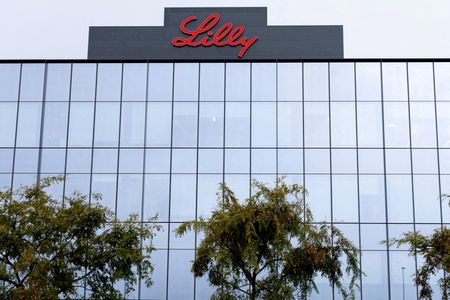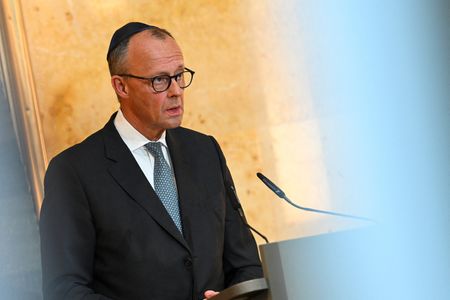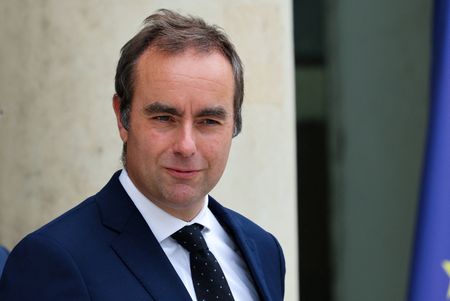By Maggie Fick and Mrinalika Roy
VIENNA (Reuters) – Eli Lilly’s bid for approval for an experimental weight-loss pill got a boost on Wednesday with new clinical trial data, but company executives said it was too soon to assume the drug will be part of a new U.S. speedy review program.
Lilly’s shares rose 0.8% on Wednesday. The company is developing the pill as an alternative to its injectable drugs Mounjaro and Zepbound, which already lead sales among diabetes and weight-loss treatments. Lilly has been trying to widen its lead in the fast-growing market for GLP-1 drugs over Danish rival Novo Nordisk
Lilly said that in a head-to-head trial of 1,698 adults with type 2 diabetes, its orforglipron lowered average blood sugar and weight more effectively than Novo Nordisk’s oral semaglutide Rybelsus.
“The data strengthens our conviction that Eli Lilly is well positioned to maintain leadership in the GLP-1 market,” said Daniel Barasa, portfolio manager at Gabelli Funds. He said orforglipron not only shows superior efficacy but also advantages in dosing convenience in the trial against Rybelsus.
Lilly, the world’s most valuable drugmaker by market value, is expanding U.S. and international manufacturing capacity to meet soaring demand for GLP-1 treatments, as it races with rival Novo to get an oral version first to the market.
However, executives at the Indianapolis company signalled caution on the U.S. Food and Drug Administration’s new priority voucher program designed to shorten reviews for certain therapies that address major public health needs.
“There is very little knowledge about this national priority voucher today. I would not assume we will submit with a national priority voucher, because we do not fully understand what it contains,” Patrik Jonsson, president of Lilly International, told Reuters in an interview on Wednesday.
Kenneth Custer, president of Lilly Cardiometabolic Health, said the company views the initiative positively and supports efforts to speed up regulatory review, but emphasized that it is too early to know how the program might apply to the company’s pipeline.
Several Wall Street analysts told Reuters this week that orforglipron could be a prime candidate for the program.
Analysts forecast orforglipron could generate peak annual sales of $10 billion and are expecting it to secure FDA fast-track approval by the end of 2025.
Jonsson said Lilly is obliged to study regulatory options but stressed the company’s base plan does not depend on the yet-to-be-defined voucher program. He added that Lilly plans to file for approval of orforglipron with regulators in the United States, Britain, European Union, Japan and China “within weeks” of each other.
Jonsson declined to specify locations for pill manufacturing outside the U.S., but confirmed non-U.S. production is planned.
Orforglipron is designed to mimic the appetite-suppressing GLP-1 hormone targeted by Lilly’s blockbuster injection tirzepatide, sold under the brand names Mounjaro and Zepbound.
Novo expects U.S. regulatory approval for its oral obesity drug later this year.
(Reporting by Maggie Fick, Sriparna Roy, and Mrinalika Roy. Editing by Mark Potter, Sharon Singleton, Chizu Nomiyama and David Gregorio)










